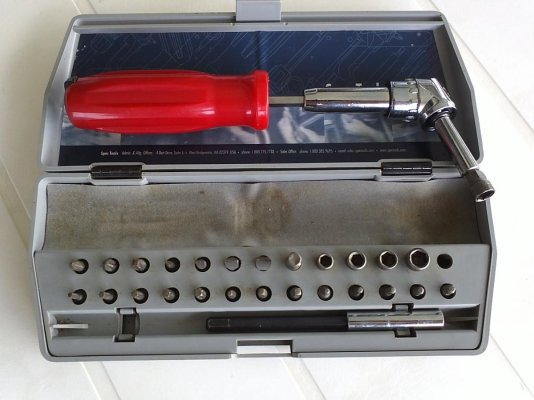As the biggest tool on this forum (and a lifetime mechanic), let me make a couple of important points.
A lot of people advocate that Brand X or that doing This or That is cheap insurance for you to keep your boat going. Well, here is a PRIME example of it and just about the only one I abide by. Cheap tools suck. Period. Harbor Freight, Wal-Mart, and the tool tent at your local flea market is NOT the place to buy tools. IMHO, having quality tools onboard is vital to sucessful boating. Sure, you can use cheaper parts here and there, but when said part breaks while underway or when you rally need to get a stubborn bolt off without destroying it and costing you perhaps hundreds or thousands in extra repair costs, THIS is when good tools pay for themselves.
Yes, some people WILL have success with cheaper tools. I don't deny that it can happen. However, when it comes to the right tool for the right job, I rarely skimp and prefer quality over quantity unless there is a specific need or that I know this will be a one-use job.
The flaw in my attitude happens when I am discovering that the Craftsman tools I have relied on for decades begin to fall victim to the shift of quality and profits by Sears and they are NOT the tools they were 25 years ago. No, they are not Snap-On or Matco, but they are still a much higher quality over HF.
I really enjoy having to go out and buy new tool. I haven't tried to have everything at once. I have slowly built-up my toolbox over the last four years and feel like I have a superior stockpile over a lot of the other boaters I know without a ton of redundancy or without a box full of stuff I won't need.
Thanks for your time... Now back to your regularly scheduled thread,

 I agree, My old dad that left us in December, bless his soul, used to say "pliers were never made for nuts but it's often nuts that use them". You see so much damage with cheap tools, pliers and vise grips instead of using the proper tool.
I agree, My old dad that left us in December, bless his soul, used to say "pliers were never made for nuts but it's often nuts that use them". You see so much damage with cheap tools, pliers and vise grips instead of using the proper tool.




 but sorry to be the bearer of bad news Tom but a friend of mine has a Snap-On truck and he says that Snap-On has been forced to go off shore for some products as well just to stay competitive. Even Costco now has a Snap-On LED work light on their shelf, made in China. I still have a full set of Gray wrenches I bought when I was a teenager nearly 50 years ago (yes I'm that old). The chrome is not as pretty as today's stuff but I have yet to break one and they have been well used.
but sorry to be the bearer of bad news Tom but a friend of mine has a Snap-On truck and he says that Snap-On has been forced to go off shore for some products as well just to stay competitive. Even Costco now has a Snap-On LED work light on their shelf, made in China. I still have a full set of Gray wrenches I bought when I was a teenager nearly 50 years ago (yes I'm that old). The chrome is not as pretty as today's stuff but I have yet to break one and they have been well used.